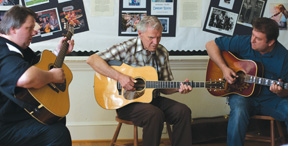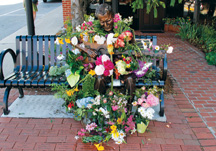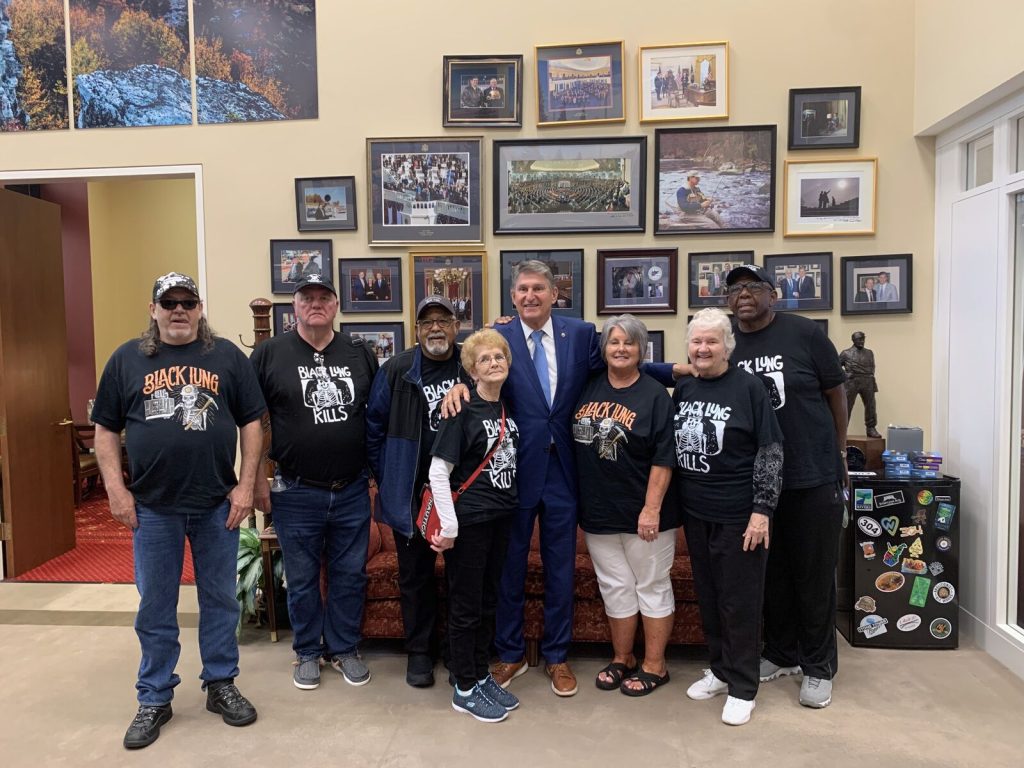Kindred in Song

In addition to being an exceptional musician, Doc Watson was a cultural ambassador. Swiss brothers Uwe (left) and Jens (far right) learned to love traditional Appalachian music from listening to his recordings. After moving to Wilkesboro, N.C., in 2003, the Kruger Brothers could often be found playing with Doc at local venues. Photo courtesy of The Kruger Brothers
“Greetings from North Carolina.” Doc Watson’s rich, syrupy baritone voice is instantly recognizable in a 1976 recording from Tokyo, Japan, where he took the stage with his son, Merle. “We’ve come to try to spread a little goodwill from our people to your people.”
After an extended, solo-filled showcase of “Roll in My Sweet Baby’s Arms” transports the audience to the hills of the North Carolina High Country, Doc and Merle’s Japanese crowd erupts in applause. They cheer and holler like any other group of bluegrass fans, grateful for the chance to hear music that, despite being from another culture, they identify with all the same. By the time Doc and Merle play “Black Mountain Rag,” the crowd is stomping their feet and clapping to the beat. With each song, it becomes clearer that this performance could have been anywhere.
Doc Watson, who passed away in the spring, was a cross-cultural communicator, an ambassador of Appalachia and traditional American music. Countless aspiring flatpickers and folk players have viewed him as a teacher, regardless of their home country or native language. Little more than a decade after his first solo appearance at Gerde’s Folk Club in New York City, appreciation for Doc’s graceful guitar playing and his humble approach to sharing the music he loved had spread around the world.
The interwoven and networked ways the world now shares music, art and culture is sometimes criticized as homogenizing heritage. But as the popularity of traditional American music spreads across cultures, borders are transcended, stereotypes are fractured and lives are transformed as musicians and fans find new ways to relate to each other. And it goes both ways; just as Appalachia’s musical influence has grown abroad, greater access to traditional music of other cultures is changing music being created in Appalachia from the inside out. Perhaps most importantly, what one sees as a threat to culture or regional identity, another sees as an opportunity for rediscovery and revival.
“In this modern world, there are ambassadors who are stronger than the political ambassadors,” Italian guitarist Beppe Gambetta, who has been called a “virtual United Nations of influences” for his fusion of flamenco, flatpicking and classical styles, told Acoustic Guitar magazine in 2003. “Doc was such a strong ambassador that I became morally American, culturally American, and I started to respect and be involved in the culture of this country because of him.”
Like Gambetta, Swiss-born brothers Uwe and Jens Kruger grew so close to Appalachian music while listening to country radio that they began to play the guitar and banjo emulating the musicians they loved the most — Doc Watson, Bill Monroe, Lester Flatt and Earl Scruggs, among others.

The bronze statue proclaiming Doc Watson as “just one of the people” in downtown Boone, N.C., was adorned with flowers in the days following his death. Photo courtesy of High Country Press / Maria Richardson
When Jens Kruger met Bill Monroe on a trip to the United States in the 80s, they played together in Nashville, Tenn., where Monroe introduced Kruger as the “first European instrumentalist to perform at the Grand Ole Opry.” Monroe asked him what he wanted to do in life, to which Kruger said that he “wanted to play bluegrass music.”
“You can’t.” Monroe replied. “You’re not from Kentucky. Go home, write your own music, and then come back.”
Before returning to join the American folk circuit, the Kruger Brothers played around Europe, adopting and incorporating new sounds, building on their folk foundation. Their style evolved into a fluid sound steeped in European and Appalachian traditions that they’ve since dubbed “new Carolina music.” By expanding on the three-finger method perfected by Earl Scruggs, Jens Kruger has been called “one of the world’s most musically sophisticated and technically accomplished five-string banjo players.”
In 2003, they adopted America as a home, specifically Wilkesboro, N.C., the site of the international bluegrass gathering Merlefest. The annual event began in 1988 as a tribute to Merle Watson, who died in an accident three years before the festival was founded. Now when they take the stage, the Kruger Brothers might play a Bill Monroe tune between their own compositions, but Jens can just as easily fingerpick a Bach cello suite.
As a genre that developed largely before it was ever recorded, traditional Appalachian music might still conjure thoughts of front porch jams where a foot tapping on wooden floorboards kept the beat. In the 20th century, studio recordings, then the Grand Ole Opry, the Newport Folk Festival and any number of small festivals around the United States brought folk, country and roots music to a much wider audience. The “high lonesome sound” of bluegrass, as Monroe described it, appealed to listeners worldwide. Decades later, YouTube and the digital revolution continue to dramatically change the ways music is created and shared.
Due to increased access to genres of music from every culture, modern folk artists draw from a web of influences with little respect to borders or boundaries. Even Doc had a cultural mosaic of musical influences and was fascinated by European virtuoso Django Reinhardt’s gypsy-jazz before he even picked up a guitar. Today, young acts from the region are finding their voice and acclaim in a more multicultural, genre-bending approach.
Sisters Chloe and Leah Smith record and tour as the aptly-named Rising Appalachia. Their sound is firmly rooted in the folk revival of their generation while compelling the listener to explore a world of far-away rhythms and exotic hymns. They busk with acoustic instruments on street corners just as Doc Watson once did; they play the fiddle and banjo, and sing in rich harmonies. But their accompanying acrobats and crowd-wide chanting add a modern edge for fans of old-fashioned folk music.
In the weeks after Doc Watson’s passing, the global folk community expressed their gratitude online, sharing memories by commenting on obituaries and message boards. On docsguitar.com, a site dedicated to his music and the instruments he used to create it, Doc is memorialized by fans from France, Belgium, Canada, the United Kingdom, Australia, Japan, Germany and many other nations.
A few months later, a crowd gathered on the lawn of the Jones House Community Center in Boone, N.C., to celebrate the inaugural “Doc Watson Day.” Two of Doc’s biggest fans and followers, the Kruger Brothers, told stories, shared memories and played a few of their favorite songs. As his brother tuned his guitar, Jens described the first time they heard a recording of Doc playing the furiously fast fiddle tune, “Black Mountain Rag.”
“Uwe just looked at me like ‘this is not possible,’” Jens said. “I still look at him like that,” Uwe admitted to the crowd.
“When we pick this tune,” Uwe continued, “it reminds us of the countless hours spent in front of the record player, turning it down to 16 RPM and trying to figure out what was on there. I still have no clue,” Uwe said as he led into the song.
Uwe sped up on the guitar and by the time Jens launched into the first solo, babies were bouncing on their parents’ knees, and the crowd had begun cheering and clapping to the beat. The stage where the brothers played was just a few miles from Doc’s birthplace and only a short walk to the downtown street corner where a bronze statue of Doc sits, but it could have been anywhere.
Related Articles
Latest News

Leave a comment
Your email address will not be published. Required fields are marked *





Thanks for reading Rich.
I love the bluegrass sound and we all attend the local bluegrass festivals every year.Sorry to hear about Doc Watson passing.He will be greatly missed im sure.Thanks for sharing this